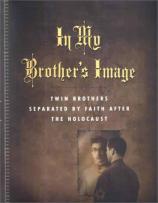In My Brother's Image: Twin Brothers Separated by Faith After the Holocaust
Review
In My Brother's Image: Twin Brothers Separated by Faith After the Holocaust
Wasn't it Truman
Capote who invented the term "nonfiction novel" to describe writing
that deals with real events and people in fictional terms? That is
exactly what Eugene L. Pogany has done with his own family's
tangled history in this moving and absorbing memoir.
Pogany's father and uncle were Jewish, twin brothers born in
Budapest but baptized as Catholics when very young, after their own
parents had become Christians. Both men experienced World War II,
but in vastly different ways. Miklos Pogany, the author's father,
suffered grievously under both Nazi persecution and Christian
indifference in Hungary, ultimately being sent to the infamous
concentration camp at Bergen-Belsen, where the horrors he lived
through caused him to lose his faith entirely. After the war he
returned to Judaism, but more as an act of protest against the
tacit acquiescence of Hungarian Christians in the Nazi campaign
against the Jews than out of any strong religious feeling.
The author's uncle, Gyuri (George) Pogany, became a devout Catholic
priest. A health problem led him to visit Italy just as the German
grip on Hungary was becoming unbreakable. He rode out the war as
secretary and confessor to the saintly Padre Pio in the south of
Italy. Ultimately, both brothers ended up living in northern New
Jersey, striving to maintain a civil relationship but always deeply
troubled by their divergent personal paths and the startlingly
different ways religious concerns had shaped their lives.
Eugene Pogany, Miklos's son, a psychologist and psychotherapist,
seeks in this searching memoir to come to terms with his family
history. He is candid about his working methods, admitting that
conversations and even characters have been reconstructed by
fictional means, but insisting that these fictional techniques are
merely a method of capturing profound truths that might otherwise
go unrecorded.
The major themes of the book are closely interwoven in Pogany's
narrative: The inner conflicts that beset Jews who embrace
Christianity (they were called "Baptized Jews" in those days, and
of course their conversion meant little or nothing to their Nazi
persecutors); the failure of Hungary's Christian (specifically
Catholic) community to do anything much to stop the Hungarian
Holocaust; the latent anti-Semitism that surfaced in Hungary and
elsewhere as Jews were rounded up and deported to the death camps;
the religious and political tensions that threatened to rupture
family unity even decades after the war was over. It is a poignant
and moving story, elegantly told by a caring and talented
writer.
The book's flaws are minor. Pogany's literary technique is a series
of discrete snapshots over time, a tactic that leaves gaps that
give the story a rather jumpy sense of interrupted continuity. Some
of the reconstructed dialogue seems stiff and unnatural, and the
story's smooth flow is diluted a bit when the author himself takes
over as narrator late in the book, replacing the impersonal
third-person narrative that had been so effective up to that point.
Pogany is a graceful writer except when he allows himself to drift
off into bits of superfluous psychological speculation.
There is no mistaking the deep personal feeling that animates this
book, however. Pogany writes as a Jew but he shows extraordinary
respect for the convictions of those in his family who embraced
Christianity, starting with his priest-uncle and his grandparents,
all of whom bulk large in his narrative. It is clear that he shares
his father's contempt for the complicity of Christians in the Nazi
horror, but his book is no diatribe. It is a thoughtful and deeply
moving story of a family that passed through Hell and cannot forget
what it saw.
Reviewed by Robert Finn (Robertfinn@aol.com) on January 22, 2011
In My Brother's Image: Twin Brothers Separated by Faith After the Holocaust
- Publication Date: October 2, 2000
- Genres: Autobiography, Nonfiction
- Hardcover: 304 pages
- Publisher: Viking Adult
- ISBN-10: 067088538X
- ISBN-13: 9780670885381



